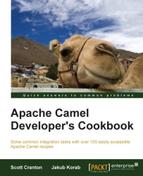- Apache Camel Developer's Cookbook
- Table of Contents
- Apache Camel Developer's Cookbook
- Credits
- About the Authors
- Acknowledgments
- About the Reviewers
- www.PacktPub.com
- Preface
- 1. Structuring Routes
- Introduction
- Using Camel in a Java application
- Embedding Camel in a Spring application
- Using Camel components
- Reusing routing logic by connecting routes
- Asynchronously connecting routes
- Spanning Camel contexts within a single Java process
- Using external properties in Camel routes
- Reusing endpoints
- Reusing routing logic through template routes
- Controlling route startup and shutdown
- 2. Message Routing
- Introduction
- Content Based Routing
- Filtering out unwanted messages
- Wire Tap – sending a copy of the message elsewhere
- Multicast – routing the same message to many endpoints
- Recipient List – routing a message to a list of endpoints
- Throttler – restricting the number of messages flowing to an endpoint
- Request-response route sending a one-way message
- One-way route waiting on a request-response endpoint
- Dynamic Routing – making routing decisions at runtime
- Load balancing across a number of endpoints
- Routing Slip – routing a message to a fixed list of endpoints
- 3. Routing to Your Code
- 4. Transformation
- Introduction
- Transforming using a Simple Expression
- Transforming inline with XQuery
- Transforming with XSLT
- Transforming from Java to XML with JAXB
- Transforming from Java to JSON
- Transforming from XML to JSON
- Parsing comma-separated values (CSV)
- Enriching your content with some help from other endpoints
- Normalizing messages into a common XML format
- 5. Splitting and Aggregating
- Introduction
- Splitting a message into fragments
- Splitting XML messages
- Processing split messages in parallel
- Aggregating related messages
- Aggregating with timeouts
- Aggregating with intervals
- Processing aggregated messages in parallel
- Splitting a message, and processing and gathering responses
- Splitting messages and re-aggregating them using different criteria
- 6. Parallel Processing
- 7. Error Handling and Compensation
- Introduction
- Logging errors
- Dead Letter Channel – handling errors later
- Retrying an operation
- Conditional retry
- Customizing each redelivery attempt
- Catching exceptions
- Marking exceptions as handled
- Fine-grained error handling using doTry…doCatch
- Defining completion actions
- Defining completion actions dynamically
- 8. Transactions and Idempotency
- Introduction
- Preventing duplicate invocation of routing logic
- Transactional file consumption
- Using transactions with a database
- Limiting the scope of a transaction
- Rolling back a transaction
- Using transactions with messaging
- Idempotency inside transactions
- Setting up XA transactions over multiple transactional resources
- 9. Testing
- Introduction
- Testing routes defined in Java
- Using mock endpoints to verify routing logic
- Replying from mock endpoints
- Testing routes defined in Spring
- Testing routes defined in OSGi Blueprint
- Auto-mocking of endpoints
- Validating route behavior under heavy load
- Unit testing processors and Bean Bindings
- Testing routes with fixed endpoints using AOP
- Testing routes with fixed endpoints using conditional events
- 10. Monitoring and Debugging
- Introduction
- Logging meaningful steps within your route
- Debugging using logging
- Throughput logging
- Enabling step-by-step tracing in code
- Disabling JMX
- Configuring JMX
- Naming your routes to make it easier to monitor
- Adding JMX attributes and operations
- Monitoring other systems using the Camel JMX Component
- Setting breakpoints in your routes
- 11. Security
- 12. Web Services
- Index
In this chapter, we will cover the following recipes:
- Routing messages directly to a Java method
- Sending messages directly to a Camel endpoint
- Using a Java method as a Predicate
- Writing a custom Camel Processor
- Mapping the message to method parameters
- Writing a custom data marshaller
- Writing a custom data type converter
In this chapter, we will be looking at a number of ways of extending Camel with your own Java code, and invoking Camel routes from your Java code.
Camel was designed to make it very easy to work with existing Java code, and to make it straightforward to invoke Camel through your code without a lot of boilerplate code typically involved in using the underlying technologies such as JDBC, JMS, and others commonly used in integration.
This chapter will explore how your Java code can send and receive message data in the form of Java parameters and return types. It will discuss how your code can be reused to inform Camel routing decisions and message processing. We will cover how to go about creating re-useable Camel abstractions that make it even easier for your team to perform common message translations, and data type conversions, that are repeated throughout your integrations.
A number of Camel architectural concepts are used throughout this chapter. There is a broader overview of Camel concepts in the Preface. Full details can be found on the Apache Camel web site at http://camel.apache.org.
The code for this chapter is contained within the camel-cookbook-extend module of the examples.
-
No Comment
